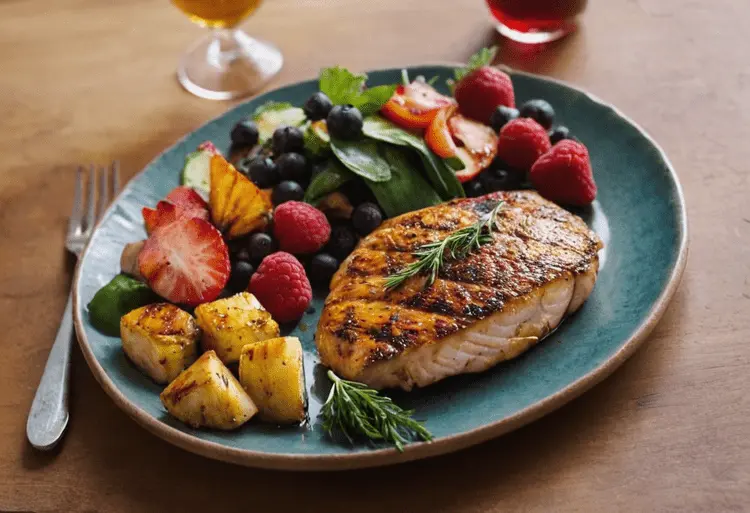The liver shrinking diet is gaining attention, but do you truly understand how it works and if it’s right for you? With so much information available, it’s easy to feel overwhelmed and unsure about the safest and most effective approach.
Following the wrong advice could put your health at risk or fail to give you the results you need for surgery or improved liver function.
This guide offers a clear understanding of the liver shrinking diet, covering pre-surgery liver reduction plans, liver shrinking foods, and how it addresses conditions like fatty liver disease.
Whether you’re preparing for bariatric surgery or seeking better liver health, you’ll find safe, effective strategies backed by expert insights.
Liver Shrinking Diet: Quick Summary
- Low-carb, high-protein focus
- Prepares liver for surgery
- May benefit fatty liver disease
- Doctor’s guidance needed
- Short-term, not for weight loss
Table of contents
Understanding The Liver Shrinking Diet

Introduction
Have you heard about the liver shrinking diet? Maybe your doctor recommended it before surgery, or you stumbled across the term online. If you have questions, you’re in the right place! Let’s dive into what this diet is all about and why it might be recommended.
The Science Behind Liver Reduction
Your liver is a powerhouse organ, and one of its jobs is to store something called glycogen. Think of glycogen as your body’s super-quick energy reserve. Is there a way to shrink your liver? Yes, and it involves depleting those glycogen stores.
How does this work? By following a very low-carbohydrate diet. When you drastically reduce carbs, your body switches to using stored glycogen (and fat) for fuel. As those glycogen stores shrink, so does your liver!
Important Note: A liver shrinking diet should always be done under medical supervision.
Ready to go beyond temporary liver reduction? Our ‘Fatty Liver Diet Plan: Reverse Your Condition Naturally‘ reveals the secrets to lasting liver health – and the surprising way it might change your whole life.
Who Needs a Liver Shrinking Diet?
This diet isn’t for everyone. Here’s who typically benefits:
- Bariatric surgery candidates: A smaller liver makes these procedures safer and easier for surgeons.
- Individuals with fatty liver disease: Reducing liver size can improve liver health.
- Others facing liver-related medical procedures: Your doctor might recommend this approach in specific cases
Is the Liver Shrinking Diet Safe?
Like any restrictive diet, there are potential risks. That’s why working with your healthcare team is crucial. They can help you navigate:
- Temporary side effects: Weakness, fatigue, nutrient deficiencies
- Contraindications: This diet may not be suitable for everyone (e.g., people with diabetes, pregnant women).
Let me know if you have any questions about liver shrinking diets. Feel free to leave a comment below or tag me on social media!
Designing Your Liver Shrinking Diet
Ready to tailor your liver shrinking diet for success? Buckle up, because we’re about to make this diet work for you!
Macronutrient Breakdown
Think of your liver shrinking diet like a temporary makeover for your eating habits. Here’s the deal:
- Carbohydrates take a backseat. We’re aiming very low for maximum impact.
- Protein gets a moderate spotlight. It keeps you satisfied and supports your body.
- Healthy fats play a small but important role.
Food Choices: What to Eat, What to Avoid
Let’s make grocery shopping simple!
- Foods to Emphasize
- Lean proteins (chicken, fish, tofu)
- Non-starchy vegetables (think leafy greens, broccoli, you get the picture!)
- Low-sugar fruits (berries are your friend)
- Low-fat or fat-free dairy (if tolerated)
Want more specifics? Check out resources like the American Liver Foundation for detailed liver-healthy food lists.
- Foods to Strictly Limit
- Grains and starches (bread, pasta, rice – they’re off the menu for now)
- Sugary fruits (sadly, no bananas or grapes during this phase)
- High-fat dairy (full-fat milk, cheese)
- Processed foods (they’re loaded with hidden carbs and sugar)
- Alcohol (your liver will thank you for the break)
Sample Meal Plans for Liver Shrinking Diet
Is the idea of switching things up overwhelming? Don’t worry! Here’s where those detailed meal plans come in handy. They offer inspiration and take the guesswork out of the liver shrinking diet.
You can find great resources, including sample meals, on the National Institutes of Health: LiverTox website
Beyond the Diet: Supporting Your Liver Reduction

Your liver shrinking diet is a powerful tool, but how do you keep those results going? Let’s dive into ways to support your liver’s health for the long haul.
Hydration is Key
Water – it’s the ultimate elixir! As you’re focusing on your liver shrinking diet, don’t skimp on hydration. Aim for plenty of water and other non-caloric beverages. This will help flush out toxins and keep your body functioning at its best.
Supplements to Consider
Should you take supplements? Talk to your doctor. A quality multivitamin can fill in those nutritional gaps as your diet becomes more restrictive. Additionally, an electrolyte supplement might be helpful to maintain balance during this transition.
The Role of Exercise
Think exercise is out of the question on the liver shrinking diet? Think again! Moderate exercise can actually boost your results. Opt for walking, swimming, or light resistance training. Just remember to listen to your body and adjust your intensity as needed.
Managing Hunger and Cravings
Feeling hungry or tempted by off-limits foods? It’s completely normal! Here are some strategies to combat those cravings:
- Portion control: Measure out your meals and snacks to stay on track.
- Mindful eating: Slow down, savor each bite, and avoid distractions while eating.
- Smart snacks: Stock up on low-calorie options like veggies, broth-based soups, or sugar-free gelatin.
Preparing for Surgery (If Applicable)
Getting ready for surgery using a liver shrinking diet involves more than just what you eat. Are you feeling a mix of determination and maybe a little worry?
That’s absolutely normal! Let’s break down the key things to manage in the days leading up to your procedure.
How Long Does the Pre-Surgery Diet Last?
Your doctor will give you the exact timeframe for your liver shrinking diet. Usually, it’s about two weeks of strict adherence. Following the plan carefully is crucial for the best surgical outcomes.
Your Pre-Surgery Team Is Here to Help
Besides your surgeon, a dietitian can be an incredible support. They can offer personalized advice for following the liver shrinking diet and address any specific concerns.
Since some medications may need adjustment while you’re on a very low-carb diet, it’s important to communicate with your doctor.
What About Blood Sugar Checks?
If you have diabetes or any blood sugar concerns, your healthcare team might recommend frequent monitoring before surgery. They’ll guide you about the right way to do this while on the liver shrinking diet.
Key Points to Remember
- Collaborate: Follow your doctor’s and dietitian’s instructions precisely.
- Communicate: Discuss any medication changes with your doctor.
- Monitor: Check your blood sugar if recommended.
Let me know if you have other questions about getting surgery-ready! Feel free to leave comments below or tag me on social media
Beyond Surgery: Maintaining Liver Health
Okay, surgery is done – now what? The liver shrinking diet served its purpose, but how do you keep your liver in tip-top shape from here on out?
Is the liver shrinking diet a forever solution? Absolutely not. This diet is quite restrictive, and you don’t want to miss out on essential nutrients long-term. The good news is, you can transition to a healthy, balanced way of eating that still supports your liver.
So, what are these liver-loving habits?

- Ditch the processed stuff. Focus on whole foods – fresh veggies, fruits, lean proteins, and healthy fats.
- Get moving! Regular exercise does wonders for your liver (and your overall health)! Aim for at least 30 minutes of moderate-intensity exercise most days of the week.
- Watch your sugar and alcohol intake. These put extra stress on your liver. Enjoy them in moderation.
- Maintain a healthy weight. Carrying extra weight can lead to fatty liver disease.
Let’s keep this conversation going! Have you tried the liver shrinking diet? What are your favorite ways to keep your liver healthy? Share your experiences below, or tag me on social media!
The liver shrinking diet helped you achieve a specific goal, but now you’re facing a new challenge: eating with a sore mouth post-surgery. Don’t worry, this soft food guide has you covered for a comfortable and nourishing recovery.
FAQs – Your Liver Shrinking Diet Questions Answered
There’s no one food that magically shrinks the liver. A very low-carb diet focused on lean protein, non-starchy vegetables, and limited low-sugar fruits helps deplete glycogen stores, leading to liver size reduction.
A calorie-restricted, low-carbohydrate diet is the primary way to reduce liver size. This approach depletes glycogen (stored sugar) in the liver, causing it to shrink.
No, rice is a grain and therefore high in carbohydrates. Liver shrinking diets strictly limit carbohydrates to maximize liver size reduction.
Your doctor will use imaging techniques (like ultrasounds or CT scans) to measure your liver’s size and track its progress during the diet.
The focus is on liver reduction, but you may lose some weight as a side effect.
Always consult your doctor first. It may be helpful for certain liver conditions.
Your doctor will use imaging techniques to monitor your progress.
Yes, your doctor can advise on the best approach for your individual situation.
It might slow your progress. Get right back on track with your next meal.